Plastic injection molding is a widely used manufacturing process that involves the injection of molten plastic into a mold cavity. This process is highly versatile and can be used to produce a wide range of plastic products with varying shapes and sizes. In this article, we will explore the advantages of plastic injection molding for manufacturing.

One of the key advantages of plastic injection molding is its high efficiency. The process is highly automated and can produce large quantities of products in a relatively short amount of time. This makes it an ideal choice for mass production of plastic products.
Another advantage of plastic injection molding is its ability to produce complex shapes with high precision. The mold cavity can be designed to produce intricate shapes with tight tolerances, ensuring that the final product meets the required specifications.
Plastic injection molding also offers a wide range of material options. Almost any type of thermoplastic material can be used in the process, including high-performance materials such as polycarbonate, nylon, and polyetherimide. This allows manufacturers to choose the best material for their specific application.
In addition, plastic injection molding is a highly repeatable process. Once the mold is set up, the process can be repeated over and over again with consistent results. This ensures that the final product is of high quality and meets the required specifications every time.
Finally, plastic injection molding is a cost-effective process. The initial tooling costs can be high, but once the mold is set up, the cost per part decreases significantly. This makes it an ideal choice for high-volume production runs.
In conclusion, plastic injection molding offers many advantages for manufacturing. Its high efficiency, ability to produce complex shapes with high precision, wide range of material options, repeatability, and cost-effectiveness make it an ideal choice for mass production of plastic products.

